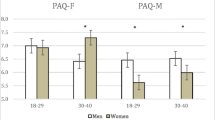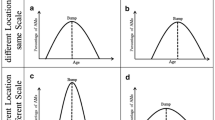Abstract
Data from 40 older adults who produced autobiographical memories to word cues and to the request to list five important memories, and data from 60 older adults who answered factual multiple-choice questions for events spread across their lives, were analyzed for gender differences. In spite of considerable statistical power, there were no gender differences in the distribution of autobiographical memories over the lifespan, in the distribution of important memories, in various ratings provided to these memories, or in the distribution of knowledge for events. The only gender difference found was that men performed better on factual questions about current events and baseball. Thus, counter to what might be expected from Darwinian theory and some behavioral data, gender differences were minimal.
Similar content being viewed by others
REFERENCES
Auriat, N. (1992). Autobiographical memory and survey methodology: Furthering the bridge between two disciplines. In M. A. Conway, D. C. Rubin, H. Spinnler, & W. A. Wagenaar (Eds.), Theoretical perspectives on autobiographical memory (pp. 295-312). Dordrecht, The Netherlands: Kluwer.
Bahrick, H. P. (1983). The cognitive map of a city: Fifty years of learning and memory. In G. H. Bower (Ed.), The psychology of learning and motivation (Vol. 17, pp. 125-163). New York: Academic Press.
Bahrick, H. P. (1989). The laboratory and the ecology: Supplementary sources of data for memory research. In L. W. Poon. D. C. Rubin, & B. A. Wilson (Eds.), Everyday cognition in adulthood and late life (pp. 73-83). Hillsdale NJ: Erlbaum.
Bahrick, H. P. (1998). Maintenance of knowledge: Findings, methods, and issues. Unpublished Mmanuscript.
Bahrick, H. P., Bahrick, P. O., & Wittlinger, R. P. (1975). Fifty years of memory for names and faces: A cross-sectional approach. Journal of Experimental Psychology: General, 104, 54-75.
Bahrick, H. P., & Hall, L. K. (1991). Lifetime maintenance of high school mathematics content. Journal of Experimental Psychology: General, 120, 20-33.
Ben-Shakhar, G., & Sinai, Y. (1991). Gender differences in multiple-choice tests: The role of differential guessing tendencies. Journal of Educational Measurement, 28, 23-35.
Bolger, N., & Kellaghan, T. (1990). Method of measurement and gender differences in scholastic achievement. Journal of Educational Measurement, 27, 165-174.
Botwinick, J., & Storandt, M. (1974). Memory, related functions and age. Springfield, IL: Charles C. Thomas.
Cowan, N., & Davidson, G. (1984). Salient childhood memories. The Journal of Genetic Psychology, 145, 101-107.
Crovitz, H. F., & Schiffman, H. (1974). Frequency of episodic memories as a function of their age. Bulletin of the Psychonomic Society, 4, 517-551.
Eacott, M. J., & Crawley, R. A. (1998). The offset of childhood amnesia: Memory for events that occurred before age 3. Journal of Experimental Psychology: General, 127, 22-33.
Erickson, E. (1950). Childhood and society. New York: Norton.
Fitzgerald, J. M., & Lawrence, R. (1984). Autobiographical memory across the lifespan. Journal of Gerontology, 36, 692-699.
Fivush, R. (1998). Gendered narratives: elaboration, structure, and emotion in parent-child reminiscing across the preschool years. In C. P. Thompson, D. J. Herrmann, D. Bruce, J. D. Read, D. G. Payne, & M. P. Toglia (Eds.), Autobiographical memory: Theoretical and applied perspectives (pp. 79-103). Mahwah, NJ: Erlbaum.
Franklin, H. C., & Holding, D. H. (1977). Personal memories at different ages. Quarterly Journal of Experimental Psychology, 29, 527-532.
Freud, S. (1950). Screen memories. In J. Strachey (Ed. and Trans.), Collected papers (Vol. 5, pp. 47-69). London, England: Hogarth Press. (Original work published 1899)
Friedman, A., & Pines, A. (1991). Sex differences in gender-related childhood memories. Sex Roles, 25, 25-32.
Galton, F. (1879). Psychometric experiments. Brain, 2, 149-162.
Gellman, E. S., & Berkowitz, M. (1993). Test-item type: What students prefer and why. College Student Journal. 27, 17-26.
Herlitz, A., Nilsson, L. G., & Bäckman, L. (1997). Gender differences in episodic memory. Memory & Cognition, 25, 801-811.
Menken, J., Trussell, J., & Larsen, U. (1986). Age and infertility. Science, 233, 1389-1394.
Mullen, M. K. (1994). Earliest recollections of childhood: A demographic analysis. Cognition, 52, 55-79.
Meinz, E. J., & Salthouse, T. A. (1998). Is age kinder to females than to males? Psychonomic Bulletin and Review, 5, 56-70.
Nigro, G., & Neisser, U. (1983). Point of view in personal memories. Cognitive Psychology, 15, 467-482.
Robinson, J. A., & Swanson, K. L. (1993). Field and observer modes of remembering. Memory, 1, 169-184.
Ross, M., & Holmberg, D. (1990). Recounting the past: Gender differences in the recall of events in the history of a close relationship. In M. P. Zanna & J. M. Olson (Eds.), The Ontario Symposium: Vol. 6, Self-inference processes (pp. 135-152). Hillsdale, NJ: Erlbaum.
Rubin, D. C. (1982). On the retention function for autobiographical memory. Journal of Verbal Learning and Verbal Behavior, 21, 21-38.
Rubin, D. C., Groth, L., & Goldsmith, D. (1984). Olfactory cuing of autobiographical memory. American Journal of Psychology, 97, 493-507.
Rubin, D. C., Rahhal, T. A., & Poon, L. W. (1998). Things learned in early adulthood are remembered best. Memory & Cognition, 26, 3-19.
Rubin, D. C., & Schulkind, M. D. (1997a). Distribution of important and word cued autobiographical memories in 20-, 35-, and 70-year-old-adults. Psychology and Aging, 12, 524-535.
Rubin, D. C. & Schulkind, M. D. (1997b). Properties of word cues for autobiographical memory. Psychological Reports, 81, 47-50.
Rubin, D. C., & Schulkind, M. D. (1997c). The distribution of autobiographical memories across the lifespan. Memory & Cognition, 25, 859-866.
Rubin, D. C. & Wenzel, A. E. (1996). One hundred years of forgetting: A quantitative description of retention. Psychological Review, 103, 734-760.
Rubin, D. C., Wetzler, S. E., & Nebes, R. D. (1986). Autobiographical memories across the lifespan. In D. C. Rubin (Ed.), Autobiographical memory (pp. 202-221). New York: Cambridge University Press.
Schrauf, R. W., & Rubin, D. C. (1998). Bilingual autobiographical memory in older adult immigrants: A test of cognitive explanations of the reminiscence bump and the linguistic encoding of memories. Journal of Memory and Language, 39, 437-457.
Skowronski, J. J., & Thompson, C. P. (1990). Reconstructing the dates of events: Gender differences in accuracy. Applied Cognitive Psychology, 4, 371-381.
Thompson, C. P,, Skowronski, J. J., Larsen, S. F., & Betz, A. (1996). Autobiographical memory: Remembering what and remembering when. Mahwah, NJ: Erlbaum.
Waldfogel, S. (1948). The frequency and affective character of childhood memories. Psychological Monographs: General and Applied, 62(4, Whole No. 291).
Wester, A. (1995). The importance of the item format with respect to gender differences in test performance: A study of openformat items in the DTM test. Scandinavian Journal of Educational Research, 39, 335-346.
Author information
Authors and Affiliations
Corresponding author
Rights and permissions
About this article
Cite this article
Rubin, D.C., Schulkind, M.D. & Rahhal, T.A. A Study of Gender Differences in Autobiographical Memory: Broken Down by Age and Sex. Journal of Adult Development 6, 61–71 (1999). https://doi.org/10.1023/A:1021676309064
Issue Date:
DOI: https://doi.org/10.1023/A:1021676309064




